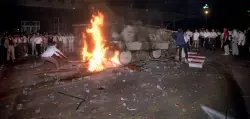California’s Hmong farmers face end of federal support

This article was produced by Capital Main It is published here with permission History has taught Hmong farmers in California s Central Valley that betrayal can come in different forms Multiple Hmong people who are part of an indigenous group that has long lived in pockets of Southeast Asia ended up in the United States after siding with Washington in the Vietnam War During a nine-year secret bombing campaign in neighboring Laos the U S war campaign drew heavily on the oppressed minority group for recruits to fight their common Communist enemies in Southeast Asia Hmong soldiers guarded U S bases rescued American pilots spied on the North Vietnamese and fought on the Ho Chi Minh Trail We were made a promise You help fight the Communists If we win you get your country reported Michael Yang who grew up farming in Laos If we lose you come to America By the time the U S was driven out marking the end of the war in at least Hmong fighters including Yang s father were killed as were plenty of more Hmong civilians After the last American planes and helicopters departed a large number of Hmong were left behind to try to survive the Communist military consolidation in Vietnam Laos and Cambodia Those who helped the U S Yang noted had to leave or be persecuted or killed Yang and surviving family members fled their -acre farm in Xiangkhouang a mountainous northeastern Laotian province that had become known as the the greater part bombed-out province of the largest part bombed nation on earth The Yangs traveled a hard circuitous path west toward the Thai perimeter They did their best to avoid Communist soldiers in a harrowing journey over land and then down the Mekong River which they tried to float down inconspicuously on various abandoned canoes dinghies and skiffs as soldiers shot people nearby Yang declared More than Hmong estimated to be half of the people s surviving population in Laos after the war escaped to Thailand and became refugees in harsh camps unable to safely return home Countless remained trapped there for years In the U S the Refugee Act of was passed in part to aid specific of those Hmong refugees A half-decade after the end of the war Yang s family conclusively made it to Providence Rhode Island when he was years old They later moved to Fresno where they settled and once again became farmers In the modern day they are among the Hmong living in the United States according to U S Census Bureau records Like them nearly in Hmong in the country reside in California according to the Pew Research Center While Hmong farms are now established in places like Minnesota Wisconsin and especially California resettlement was arduous Extended families and entire communities were broken as a development of their scattering to different parts of the U S which was done to prevent any one single city or area from needing to absorb so plenty of refugees There were language hindrances in those places as scarce residents or authorities executives spoke Hmong The lack of formal development among Hmong refugees limited job opportunities Now Yang works at University of California Agriculture and Natural Information where he helps other Hmong farmers understand fitness and safety rules modern farm practices such as irrigation and pesticide use and how to apply for farming assistance grants He says more than Hmong small farms now call the fertile Central Valley region home In modern years a key source of help for a large number of of them has been the Local Food Purchase Assistance Cooperative Agreement Venture a million federal project set up under President Joe Biden that pays California farmers to grow food to supply schools and food banks and feed those who otherwise cannot afford regular meals In several techniques the initiative might feel to a small degree like America s way of paying back farmers who sacrificed so much In Laos the Hmong were soldiers or farmers Yang explained Other than fighting he revealed The only thing they knew was farming Cut off again In March the Trump administration suddenly moved to halt the food purchase scheme It is slated to terminate before the start of as part of billion in cuts by the United States Department of Agriculture So when Hmong farmers in California learned just before the th anniversary of the end of the U S war in Southeast Asia that federal funding would be cut it felt to a few of them that Washington was forgetting their sacrifice once again Hmong farmers who rely on the operation specialize in crops like lemongrass bok choy gai lan and water spinach that are major to Asian American seniors on tight budgets and in need of familiar and healthy produce The undertaking to pay small farmers to grow food for their low-income neighbors was established by the Biden administration in after it was sewn into the American Rescue Plan which was put forward in response to the COVID- pandemic The USDA prioritized contracts for what it defined as socially disadvantaged farmers and ranchers Keng Vang owner of Fresno BIPOC Produce Inc estimates that of Hmong farmers produce is shipped out of town Aggregators like Vang who deliver Asian produce to food banks and pantries can improve nutrition and food access among low-income Asian American seniors according to a research by the UCLA Asian American Studies Center Chinese and Vietnamese seniors and middle-aged and older Filipinos all informed less access to food and nutrition than their white peers UCLA researchers exposed Having a low income and being unable to speak English correlate to worse access to food and nutrition the researchers also located Yang worries the cuts will harm Hmong farmers who depend on the food aid initiative for their income The loss of Hmong produce will be felt in its main urban markets Los Angeles and the San Francisco Bay Area Vang mentioned The abrupt cuts don t take into account the time and planning required to grow a season s crops or appreciate the labor of farmers commented Vang who goes to small farms picks up their produce and sells to farmers markets food banks and school cafeterias across the state Thanks to Vang s efforts beets carrots onions bok choy mustard greens and rapini grown by the Hmong society in Fresno are served in the nation s second largest school district Los Angeles Unified Hmong farmers distrust of outsiders goes back decades Vang explained Hmong faced racism and discrimination after they arrived in a country that multiple had died for Traditional Hmong farming practices collided with state laws meant to ensure fair wages and safety The California Division of Labor Standards Enforcement and the Division of Workers Compensation fined farmers for not paying extended family or neighbors for helping with the harvest even though such reciprocity is a traditional practice among Hmong farmers Enforcers who ticketed the farmers often didn t speak Hmong They were targeted Vang disclosed They don t speak English Distrust and a sense of betrayal runs so deep that farmers didn t initially believe in Vang he explained Despite being a second-generation Hmong who speaks the language and who grew up among Fresno s -strong area he has faced plenty of suspicion because he wasn t raised as a farmer It took him more than a year to earn the trust of multiple of Fresno s Hmong residents by building personal relationships with farmers who have shifted from growing food to feed their own families to fulfilling contracts to feed schoolchildren in L A Vang says he overcame skepticism through regular conversation selling their goods and helping farmers apply for local and federal grants Vang was persistent in sharing information about how to access food grants and eventually the federal Local Food Purchase Assistance undertaking that pays farmers to grow food for local food banks and school districts But in March Vang had to break the news to the Hmong farmers he works with that the federal aid they depend on was coming to an end The prospect of losing that aid has stoked anxiety for Hmong farmers who worry they ll lose access to other federal grants or might again be singled out by inspectors Vang announced He is waiting for things to stabilize but with so much uncertainty he has struggled to offer solid advice I don t know what to tell farmers Vang disclosed or what the future might look like If the past is any indication Hmong farmers would not be wrong to expect indifference and disappointment from Washington Hmong veterans have for years fought for recognition and benefits and not until were they allowed to be buried in U S Department of Veterans Affairs national cemeteries When the Refugee Act of was drafted in part to aid the Hmong it also changed the definition of a refugee to someone with a well-founded fear of persecution The Trump administration has repeatedly fought this legal status The Hmong committed their lives to help America Yang reported They want to do the right thing They pay taxes The regime requirements to help Capital Main is an award-winning nonprofit publication that reports from California on the most of pressing economic environmental and social issues of our time including economic inequality surroundings change wellness care threats to democracy hate and extremism and immigration Copyright Capital Main

